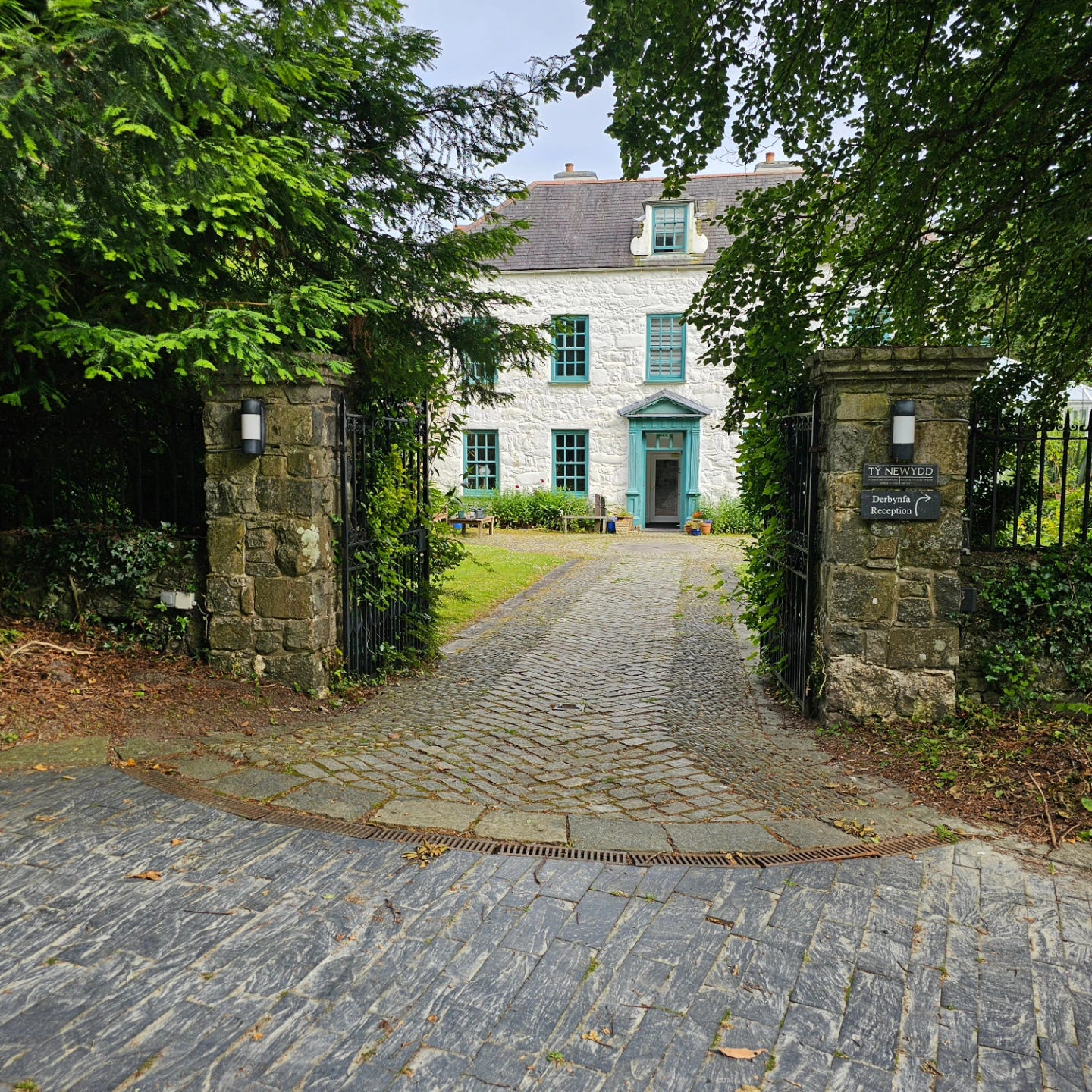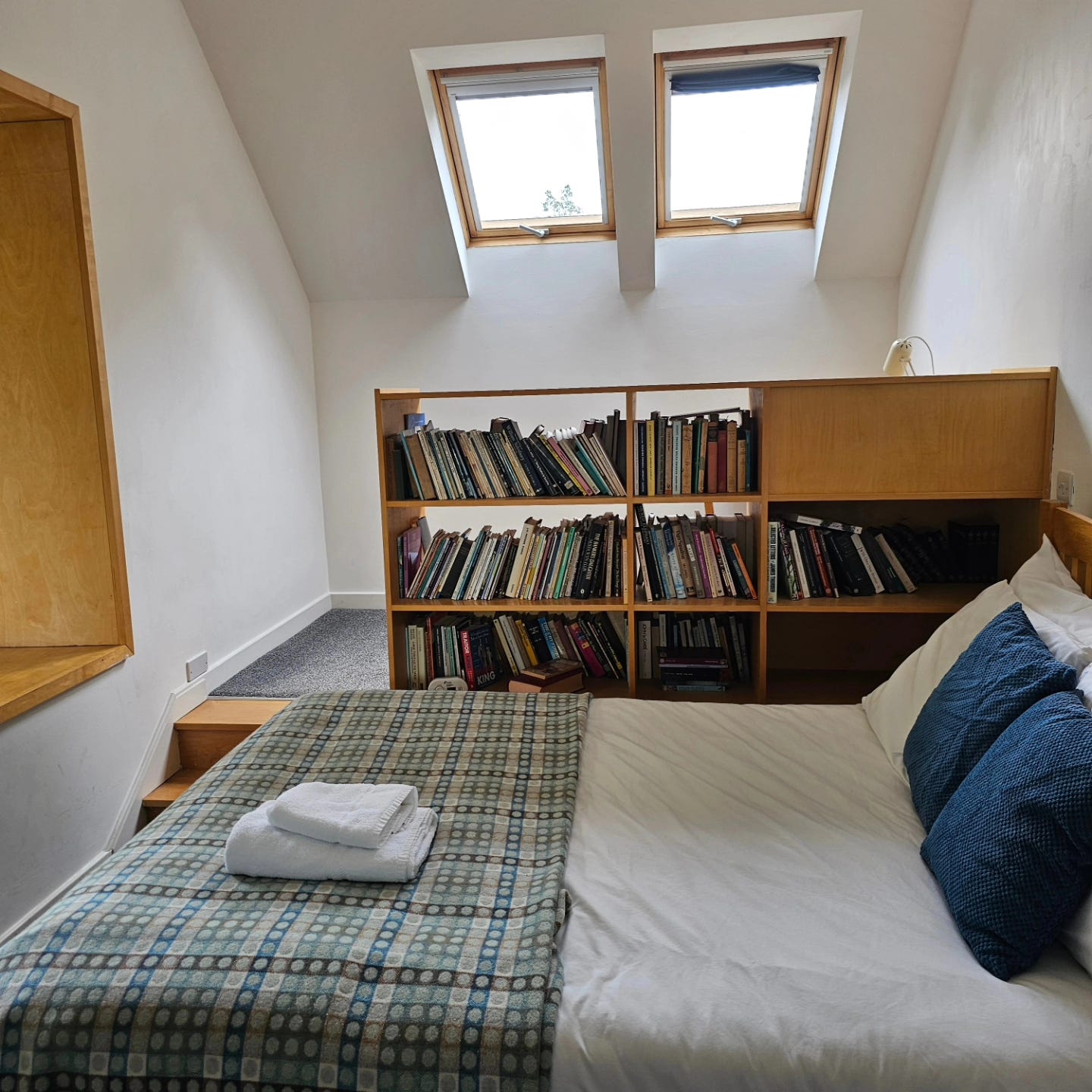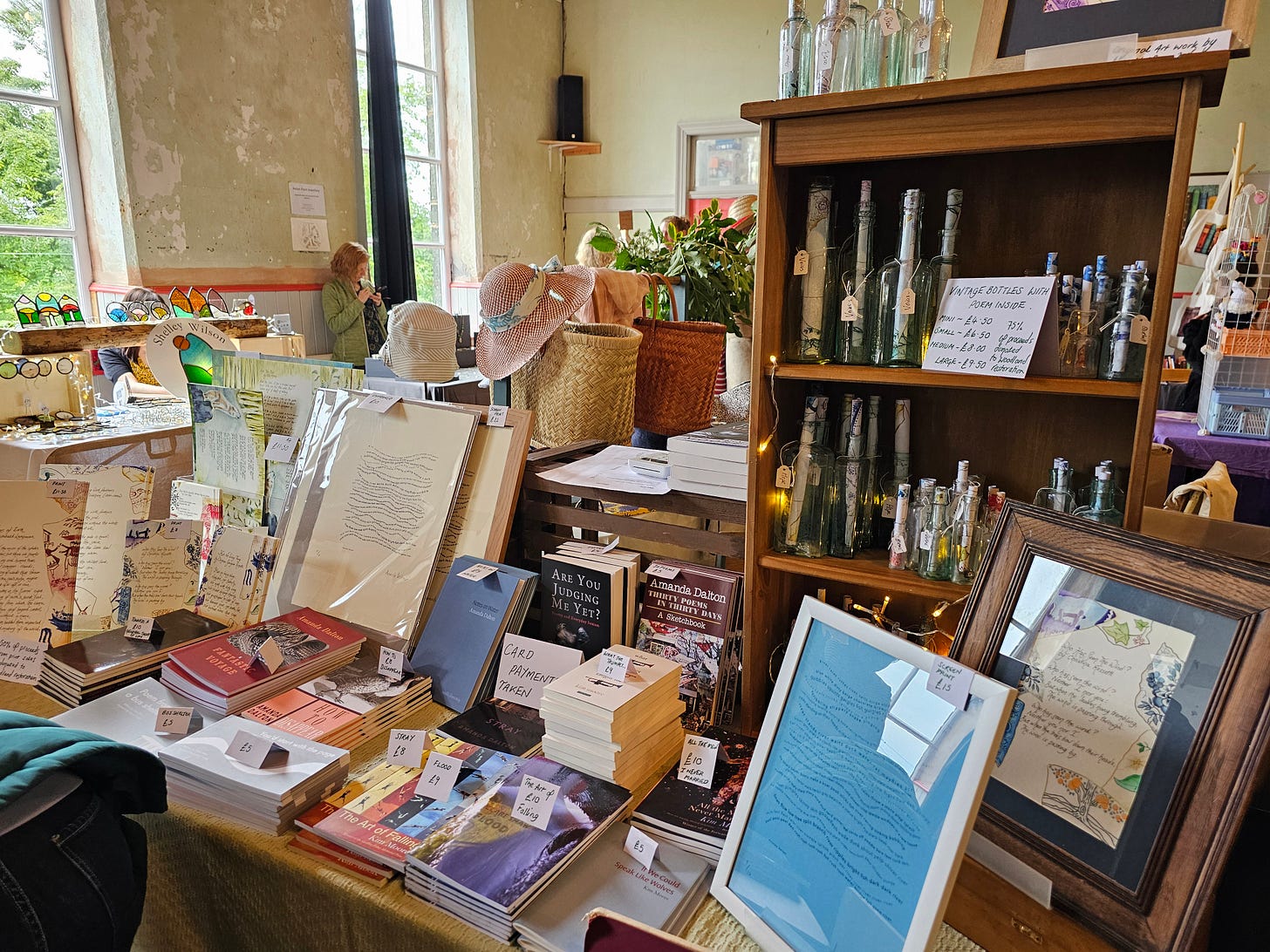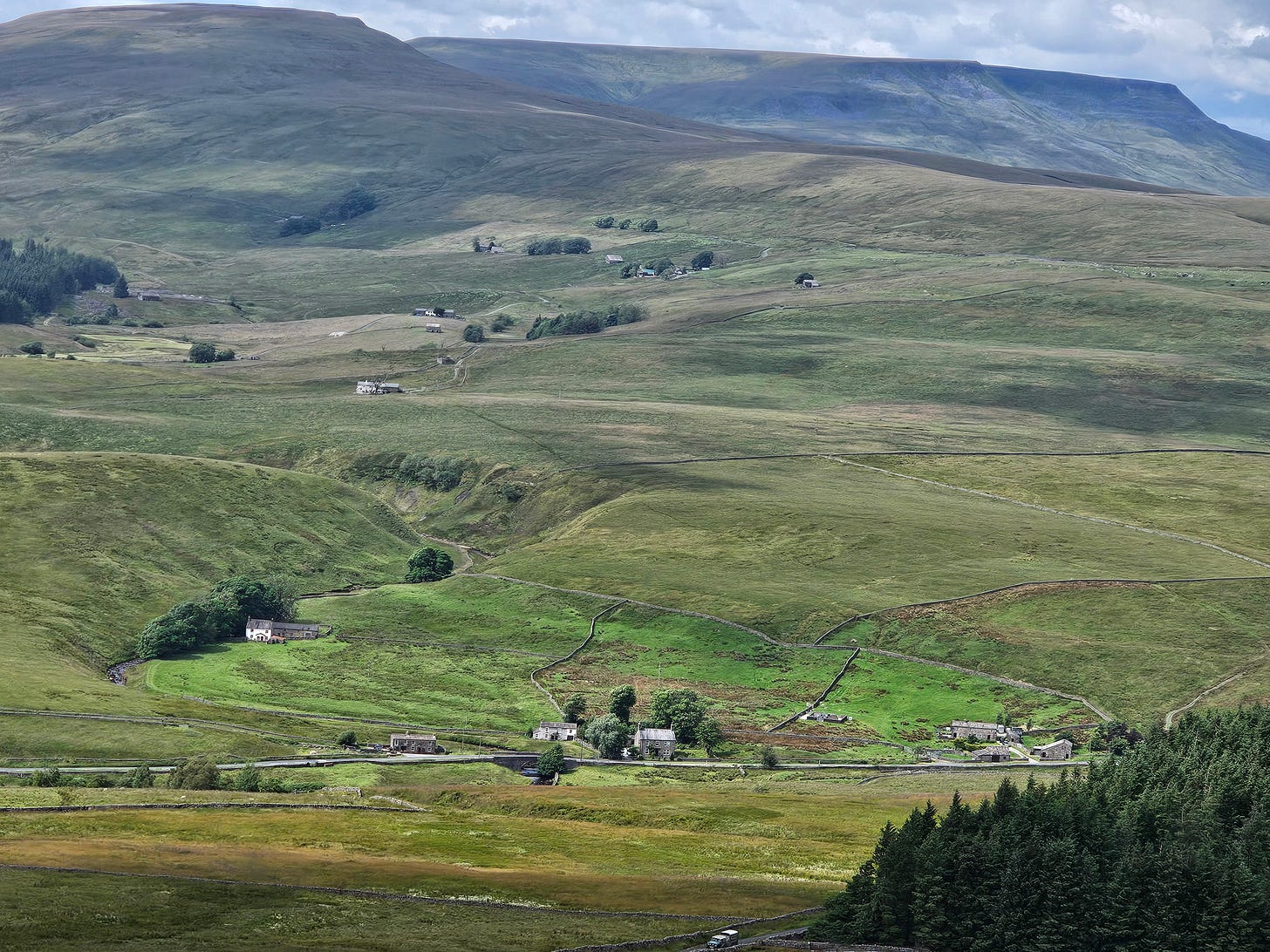Hello to all of our new subscribers, and the ones who have stuck with us so far! I’ve been away from home for the past couple of weeks so it’s been a bit of a hectic time. My first week away was a trip down to Ty Newydd to cover a Tutored Retreat. The booked tutor was taken ill so with three days notice, I got the train down to Criccieth and arrived at one of my favourite places in the world.
Every time I walk up this drive, as cliched as it sounds, my heart does a little leap in my chest. This was the place where everything really started for me. I came on a course here in 2007. The tutors were Nigel Jenkins and Sarah Kennedy. In those days, participants worked to create an anthology to take home at the end of the week. I’ve just dug mine out to have a look at what I was working on.
I’ve got four poems in the anthology - three I can see now are sketches for what would become All the Men I Never Married (Seren, 2021) nearly fifteen years later. A love poem, a poem about a terrible ex-boyfriend and an elegy for a male friend who’d died that year. The fourth poem is an attempt at a sonnet called “Trumpet”. In that poem, I’m trying to write about the complicated process I was going through of leaving my trumpet behind, of wrestling with performance anxiety, of realising being a musician was not something I wanted to dedicate my life to anymore. The poem fails in its attempt to capture all of this - but what I was trying to write about became, fifteen years later a whole book What the Trumpet Taught Me (Smith/Doorstop, 2022).
The seeds of whole books were in those poems - and that both surprises me and doesn’t surprise me. To go on a residential course for a week, to take a week out of your life, to commit the finances to do that - magic can happen during those weeks - but sometimes the magic doesn’t show itself for years, or if you’re lucky, the magic does show itself and then keeps growing for years afterwards.
I remember at the time that my mum was a bit appalled at the amount of money I was going to spend to go off and write poetry. In fairness to her, it doesn’t sound the most sensible idea - but now I can see a through line from that first course to the subsequent books I’ve written. That course was so important to me - I was working as a full time music teacher, and I escaped into poetry in that house.
This was my bedroom for the week at Ty Newydd.
After I got back from Ty Newydd, I had a couple of days at home with my little girl and then a half day at Wainsgate Walking Market. I managed to rope Clare Shaw, Amanda Dalton and the artist Alice Wolfe into running a stall with me. Here is a picture of our lovely stall, expertly curated by Clare and Alice in the morning. Amanda and I took the afternoon shift, which mainly involved dancing about and eating cake.
Alice has created some beautiful prints of both mine and Amanda’s work, which are available for sale - if you would like one of these, please email Alice on aliwolfe682@gmail.com
After the excitement of the market, I had a night to pack and then I was off on my travels again to the Garsdale Retreat. The Garsdale Retreat is the house at the bottom of the hill, dead in the centre of the photograph. I took this on one of my runs from the top of the moor.
Garsdale is special to me in a different way - I’ve taught there six or seven times now. The food is wonderful, and Hamish and Rebecca look after everyone so well. I had a wonderful group of writers to work with and multiple puddings a day.
Then from there I went to Shap to work with Shap Writers group for the morning. In the afternoon, I popped over to Katie Hale’s book launch for her new novel The Edge of Solitude. You can find out more about the book over on Katie’s substack, here.
It was lovely to catch up with Katie, grab a copy of the book and talk to some Cumbrian poets that I’ve missed since moving away. Then I had a reading in the evening in Shap, and then it was finally back to Hebden Bridge on Sunday.
This week, I’m running some Late Night Writing Hours - the first one was last night at 9pm, but it’s not too late to join in! It’s £15 for the remaining four sessions, or £5 per night.
Today’s poem is by Olivia Tuck, a poet who is currently working with Clare Shaw. Clare sent me Olivia’s pamphlet manuscript and asked me what I thought - I absolutely loved her work so asked if I could feature one of the poems on here. Her pamphlet is called Mistress of the Arts and I fully expect it to be snapped up by a discerning publisher (or at least it should be!)
The poems range far and wide in the themes they cover, but many of the poems centre around the experience of being a neurodivergent writer in academia, and the surreal, strange and sometimes uncomfortable experience of having your poems workshopped. If that sounds too navel-gazing - it really isn’t - Olivia pops the bubble of pomposity that can develop around the creative writing workshop and calls attention to the often de-humanising way we talk about people’s work. But even that feels too narrow - the poems are also about the nature of teaching and learning and how neurodivergent writers move through these spaces and are bruised by them.
Throughout the pamphlet, there is the figure of ‘Clover’ - possibly a fellow workshop participant, a lover, a muse, possibly an imaginary figure, or perhaps Clover is all of these things at different times. Clover doesn’t appear in the poem I’m going to share here, but I wanted to mention her because she is a huge part of the pamphlet.
Olivia has given me permission to share her poem “The Obligatory Future Child Poem”. This poem was a runner up in the Jane Martin Poetry Prize, as well as being part of Olivia’s longlisted submission to the Rebecca Swift Foundation Women Poets’ Prize.
I love how this poem begins mid story, as if we are in the middle of a conversation with the speaker. The “Lost Girls” are girls with autism or other neurodivergence, who slip through the gaps of diagnosis in a medical system that was designed to recognise the way nuerodivergence presents in boys rather than girls. The “Lost Girls” in this poem don’t just live without diagnosis though, they are lost by parents “between the party table and the water feature”, they are lost between taunts and pinches from classmates, and they are lost because of a teacher’s “averted eye”. It’s not just about what we don’t see in this poem, but about what we choose not to see, or look away from.
I love how sure footed the line breaks are throughout this poem, how it tumbles down the page, and in its tumbling, leads us through years, from the speaker as child, to the speaker as a mother with a child of her own who has “spring-white fingers” and who “murmurs her universe to herself”. By the end of the poem, it feels as if “Adelaide” is not only a future child, but a past self, the child inside the speaker that is called upon almost like a spell of protection from suicide ideation.
And she does this all in one long, twisting, turning sentence, which to me feels perfect for representing the movement of a neurodiverse mind. This mind follows its own train of thought, doesn’t stop for breath (or at least doesn’t stop for very long). Look how the poem clarifies all the ways that Lost Girls are lost, before leaping into that wonderful metaphor - that to be a Lost Girl is “to reach through smoke for a rung / that isn’t there”.
And this poem is centred of course on answering those intrusive, thoughtless questions that are directed at women who don’t have children. There is the unspoken question that the first line answers ‘If I were to have one, I’d call her Adelaide’ - but further down the poem, the speaker addresses the you directly, repeating the question ‘you ask me don’t you want your own family’ before it careers off at full speed to answer this complicated, loaded question.
If you’d like to read more of Olivia’s work, she has a pamphlet published with Black Rabbit Press called Things Only Borderliners Know which you can order here
Thank you to Olivia for allowing me to share her poem here!
THE OBLIGATORY FUTURE CHILD POEM
OLIVIA TUCK
If I were to have one, I’d call her Adelaide
after the Australian city because it’s where,
if I could, I’d fly south every year
for my winter hit of kindling-wild summer – she’d lie
in her pram, at the starts of birches and utility poles,
enraptured at their branches’ and cables’ flickering
before the sky, and later she’d hate hair brushing time,
and just as my parents, devoid of the vernacular, always knew,
I’d know there was something wrong different –
we’re known as the Lost Girls because they lose us
between the party table and the water feature,
between the taunt/pinch and the teacher’s averted eye,
between the unzipped fly and the bed,
and to be a Lost Girl is to reach through smoke for a rung
that isn’t there, to lick a climbing frame’s steel limb
as other children play Grandma’s footsteps,
this loss so whole and irredeemable,
us like iPhones dropped from research vessels
above the Challenger Deep, that I could never bear
to let love surge in over me: please let me tell you this,
you ask me don’t you want your own family and I see
July, diesel-thick and cloying, and me at the table
with the other mothers, drinking gin-infused Pimm’s
and diligently nodding, while my little Addie –
she’s five now – the outlier on the grass’s scatter graph
of children, murmurs her universe to herself,
flickering her spring-white fingers at the wind,
and one of the little boys pushes her and smears
Iceland chocolate gateau on her new tiny lilac dress
and his mother fails to stop her eyes laughing
and another mother looks at me, clears her throat
and says, have you ever thought she might be, and quite
apart from this, at sleep’s first slow swallow, I listen
as her mewl fractures the walls, I in a locked room, lying
in a bath of my own blood and screaming Addie! Adelaide! –
I call on the things I’ve been unable to do
to the people I love – as in high-speed trains,
as in the Clifton Suspension Bridge at high tide –
I call on Addie’s face, thumb in mouth, the switchblades
of her cheekbones, and fuck, I couldn’t, I couldn’t.













Fantastic poem.
What a treat this poem is 💜